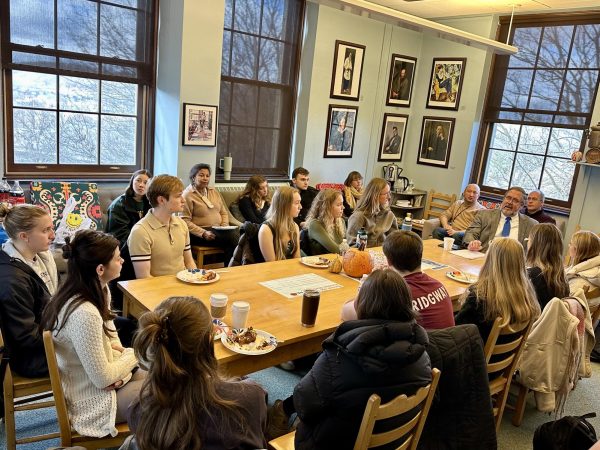Gold Medal Favors Team Canad
Four years removed from its Canadian defeat in the gold medal game of the Salt Lake City Olympics, Team USA is again searching for gold in Torino. This time, however, the Americans will have intens competition, as Russia and the Czech Republic both boast All-Star rosters. Then, there is Team Canada, the perennial Olympic contender that possesses the competition’s strongest all-around squad.
The American team has drawn extensively from the NHL, but many of its players seem second-tier when compared to their Canadian opponents. The real strength of Team USA is in its defense. With Chris Chelios, Darien Hatcher, Brian Rafalski and Mathieu Schneider, the Americans have a blue line capable of both shutting down opposing forwards and supporting the attack, especially on the power play.
The offense is a bit questionable, however. Mike Modano and Bill Guerin are the most recognizable talents, although both are arguably past their prime. Rising players such as Scott Gomez, Erik Cole and Mike Knuble will all be relied upon for peak performances if Team USA is able to compete on offense.
Equally in doubt is the ability of Team USA’s three goaltenders – Rick DiPietro, Robert Esche, and John Grahame – to provide stability in the net. Islander fans have waited several years for DiPietro’s emergence, but so far he remains a solid goalie with a lot of upside. Esche seemed to grab the starting spot on the Flyers after a strong finish to the 2003-2004 season and a superb showing in the playoffs, but injuries and inconsistency this year have led to more playing time for Team Finland’s Antero Nittymaki. John Grahame has assumed a back-up role for most of his career and is something of a wildcard after a strong first half as Tampa Bay’s starting netminder.
The Czech and Russian teams both have a large number of players drawn from local clubs, and so their talent level is difficult to predict. However, each squad boasts elite NHL players who are more than capable of carrying the load. With Jarmoir Jagr, Robert Lang and Patrick Elias leading the attack, the Czechs should score often. A lackluster defensive unit is more than offset by the All-Star duo of goaltenders Dominik Hasek and Tomas Vokoun.
Russia has goaltending and defense issues, although it does boast San Jose netminder Evgeni Nabokov and Pittsburgh’s dynamo blue-liner Sergei Gonchar. Like the Czechs, the real strength of this team is in scoring. With a string of quick-skating forwards that includes Ilya Kovalchuk, Pavel Datsuk, Alexei Kovalev, Alexander Ovechkin and Alexei Yashin, Russia might have the best offense in the Olympics.
When it comes to balance, Team Canada takes the cake. Goaltenders Martin Brodeur, Roberto Luongo and Marty Turco would each be starters on almost every other Olympic squad. The defense is equally impressive, with Chris Pronger, Wade Redden and Scott Niedermayer providing a range of talents similar to the American blue-liners.
Although the Russians have flash in their top-five skaters, the Canadians arguably have even more offensive depth. With a roster of forwards that would make any coach’s mouth water, our neighbors to the north boast talent across the board. In a departure from the past, the team is going with a youth movement, and features a number of players making their Olympic debut. This includes Dany Heatley, Vincent Lecavalier, Rick Nash and Martin St. Louis. The team still has a veteran presence, though, and seems to posses the size, speed and experience to run the competition into the ice.
Tournaments like the Olympics are always difficult to predict. A hot run by a goaltender, such as Team USA’s Mike Richter in 2002, can propel a squad to the top. Keeping out-of-this-world individual performances aside, Canada seems like the best bet to take the gold. Canada has no real clear-cut weakness, and can play any style of hockey to win. Taking the silver is the Czech Republic, which boasts enough elite NHL players to carry them through most of the tournament. Capturing the bronze is Team USA, which lacks star-power, but has enough balance to edge out the Russians, whose strength lies almost exclusively in its quick-strike offense.
The first round starts on Wednesday, with the US playing Latvia, Russia playing Slovakia, Canada playing Italy, and the Czech Republic playing Germany. The competition continues until the medal rounds, with the bronze being decided on February 25 and the gold the following day.





